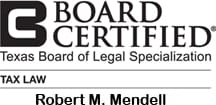What Is The Alternative Minimum Tax?
The alternative minimum tax (AMT) is basically a separate and parallel tax system from the traditional federal income tax system. The AMT requires individuals to recalculate the amount of tax they owe under a different set of rules by including income that would otherwise be exempt from regular taxation. AMT is a tax that must be paid in addition to, not instead of, regular taxes. Congress created the AMT to prevent wealthy taxpayers from paying a minimal amount of or even no taxes because of various exemptions, deductions and other preferences in the Internal Revenue Code.
All taxpayers that are subject to regular tax are also subject to the AMT. All individuals, corporations, trusts and estates are potentially liable for the AMT. Partnerships and S corporations, which are pass-through entities and not subject to regular tax, are not subject to AMT.
The AMT is not an alternative to a taxpayer’s regular federal income tax; rather it is an addition to income tax. What is considered income, a deduction or an exemption under the AMT system is different from what qualifies as income, a deduction and an exemption under the regular tax system. Under the AMT system, personal exemptions for individuals, spouses and children are not permitted. Deductions for mortgage interest and/or any state and local taxes paid by the taxpayer are also not permitted. If there is a possibility that a taxpayer owes AMT, that taxpayer must recalculate his or her taxable income as defined under the AMT, apply the alternative tax rates, take into account any applicable credits and compare the potential AMT liability to the regular tax burden.
The amount of AMT that a taxpayer owes is the amount, if any, by which AMT liability exceeds regular tax liability. For example, if a taxpayer calculates that he owes $10,000 in taxes under the regular system and the AMT is $10,500, the taxpayer has an AMT liability of $500. Essentially, after calculating the amount of taxes owed under the regular and AMT systems, the taxpayer pays the higher of the two amounts.
In recent years, the number of people affected by the AMT has increased dramatically. This increase is due to the fact that, unlike regular income tax, exemptions in the AMT are not adjusted for inflation. In addition, application of tax credits, such as the child credit, has caused many taxpayers to have a lower tax liability under the regular tax system.
It is more likely for married taxpayers filing a joint return to be affected by the AMT then unmarried taxpayers with similar income. There are a few reasons for this. Typically, married couples have more dependents than single taxpayers, and under the AMT these married taxpayers are less able to use exemptions and credits for children than under the regular tax system. In addition, married taxpayers have a larger standard deduction than single taxpayers. Individuals who pay high state and local taxes are also more likely to pay AMT because there is no deduction for these taxes under the AMT system.
Congress has enacted temporary increases in the income levels that are exempt from the AMT in the past few years as a way to counter the increasing number of people who are affected by the tax. For the 2007 tax year, the income exemption was increased to $44,350 for a single taxpayer or head of household, $66,250 for married couples filing jointly and $33,125 for married people filing separately. These increases are only in effect for one year. Thus, unless Congress raises the income levels again for the 2008 tax year, the exemptions will be reduced back to $33,750 for single taxpayers, $45,000 for married couples filing a joint return and $22,500 for married people filing separately. If Congress does not raise the exemptions, it is likely that many more people will be subject to the alternative minimum tax.
Copyright © 2008 FindLaw, a Thomson Reuters business
DISCLAIMER: This site and any information contained herein are intended for informational purposes only and should not be construed as legal advice. Seek competent counsel for advice on any legal matter.



